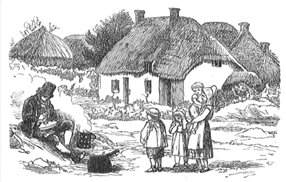can be well at home for a year together? It wasn’t so twenty years ago,—not a bit of it. The Browns didn’t go out of the country once in five years. A visit to Reading or Abingdon twice a-year, at Assizes or Quarter Sessions, which the Squire made on his horse with a pair of saddle-bags containing his wardrobe—a stay of a day or two at some country neighbour’s—or an expedition to a county ball or the yeomanry review—made up the sum of the Brown locomotion in most years. A stray Brown from some distant county dropped in every now and then; or from Oxford, on grave nag, an old don, contemporary of the Squire; and were looked upon by the Brown household and the villagers with the same sort of feeling with which we now regard a man who has crossed the Rocky Mountains, or launched a boat on the Great Lake in Central Africa. The White Horse Vale, remember, was traversed by no great road: nothing but country parish roads, and these very bad. Only one coach ran there, and this one only from Wantage to London, so that the western part of the Vale was without regular means of moving on, and certainly didn’t seem to want them. There was the canal, by the way, which supplied the country-side with coal, and up and down which continually went the long barges, with the big black men lounging by the side of the horses along the towing-path, and the women in bright-coloured handkerchiefs standing in the sterns steering. Standing I say, but you could never see whether they were standing or sitting, all but their heads and shoulders being out of sight in the cosey little cabins which occupied some eight feet of the stern, and which Tom Brown pictured to himself as the most desirable of residences. His nurse told him that those good-natured-looking women were in the constant habit of enticing children into the barges and taking them up to London and selling them, which Tom wouldn’t believe, and which made him resolve as soon as possible to accept the oft-proffered invitation of these sirens to “young master,” to come in and have a ride. But as yet the nurse was too much for Tom.

The Vagabond
Yet why should I after all abuse the gadabout propensities of my countrymen? We are a vagabond nation now, that’s certain, for better for worse. I am a vagabond; I have been away from home no less than five distinct times in the last year. The Queen sets us the example—we are moving on from top to bottom. Little dirty Jack, who abides in Clement’s Inn gateway, and blacks my boots for a penny, takes his month’s hop-picking every year as a matter of course. Why shouldn’t he? I’m delighted at it. I love vagabonds, only I prefer poor to rich ones;—couriers and ladies’ maids, imperials and travelling carriages, are an abomination unto me—I cannot away with them. But for dirty Jack, and every good fellow who, in the words of the capital French song, moves about,
“Comme le limaçon, Portant tout son bagage, Ses meubles, sa maison,”
on his own back, why, good luck to them, and many a merry road-side adventure, and steaming supper in the chimney corners of road-side inns, Swiss châlets, Hottentot kraals, or wherever else they like to go. So having succeeded in contradicting myself in my first chapter (which gives me great hopes that you will all go on, and think me a good fellow notwithstanding my crotchets), I shall here shut up for the present, and consider my ways; having resolved to “sar’ it out,” as we say in the Vale, “holus bolus” just as it comes, and then you’ll probably get the truth out of me.
| Previous chapter/page | Back | Home | Email this | Search | Discuss | Bookmark | Next chapter |